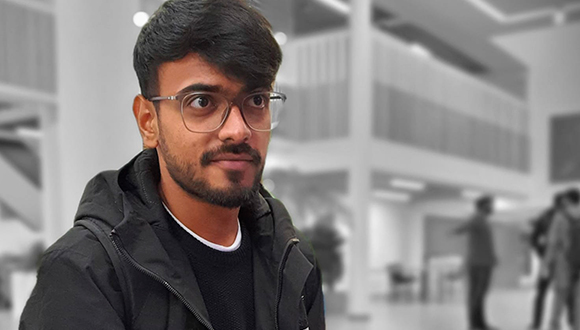Fri, 15 January, 2021
NSIRC is Delighted to Welcome the First New PhD student of 2021.
Kartikey Mathur has joined the NSIRC PhD programme and will be based within Industry at TWI in Cambridge. His PhD is awarded by Lancaster University, one of the UK's top universities in The Guardian University Guide, and sponsored by Lloyd's Register Foundation, a founding partner of NSIRC.
Working within the Friction and Forge Processes Section, Kartikey will receive PhD supervision from both an Industrial Supervisor and an Academic Supervisor, a unique benefit to NSIRC graduate students.
.......
 Kartikey Mathur, PhD Student with NSIRC and Lancaster University, his research is sponsored and supported by Lloyd's Register Foundation.
Kartikey Mathur, PhD Student with NSIRC and Lancaster University, his research is sponsored and supported by Lloyd's Register Foundation.
Hi Kartikey, congratulations on joining NSIRC! Could you tell us a little about academic background?
Thank you! I hold an undergraduate degree in Mechatronics Engineering and I my Master's is in Naval Architecture & Ocean Engineering from the Indian Maritime University. During my undergrad degree, I was more inclined towards industrial robotics and control systems. So, I choose to follow my interest in robotics and designed and fabricated a coral monitoring ROV as a part of my Master's degree.
What made you choose this higher education programme?
After my Master's I started looking for PhD positions related to Industry 4.0 and Digital Manufacturing. That's when I came across this PhD position. I have known about TWI since my M.Tech and when I got the call for an interview, I knew that this was the perfect opportunity to contribute to the field of Digital Manufacturing.
Could you tell us about your topic and why industry is calling for this research?
There has been significant research in the field of Friction Stir Welding (FSW) but researchers have been more focused on optimising the process mechanically. I am working on the project `In-process Quality Monitoring of Friction Stir Welding'.
In-line fault detection has always been a critical job for Friction Stir Welded parts. My research would be focused on merging machine learning with FSW to provide efficient solutions to in-line fault detection and quality management.
What are your aspirations for after your research degree?
FSW has a wide range of applications and there are many variants employed in different industries. After my PhD, I would like to extend my research on assessing the efficiency of the FSW process using Parallel Kinematic Machines (PKMs).
If you could give advice to someone who may be thinking about applying to be PhD candidate with NSIRC, what would it be?
For anybody who is looking to contribute to society with their research, NSIRC is the place to be.
The unparalleled industrial exposure and supervision from experts would not only enhance your knowledge, but would also give your research new dimensions. NSIRC and TWI's vast industrial collaboration keeps you in pace which the advancement in technology and the present need of the industry.
......
Other NSIRC stories to read: